英语笔译:文学文本的翻译共34页文档
- 格式:ppt
- 大小:2.30 MB
- 文档页数:34
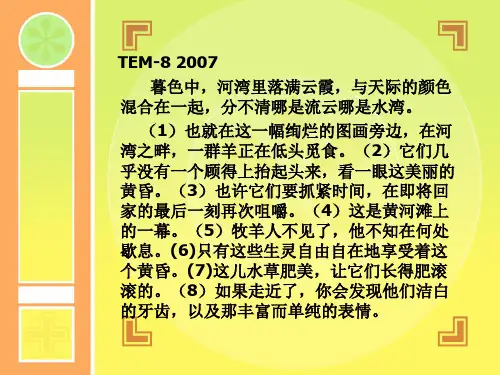

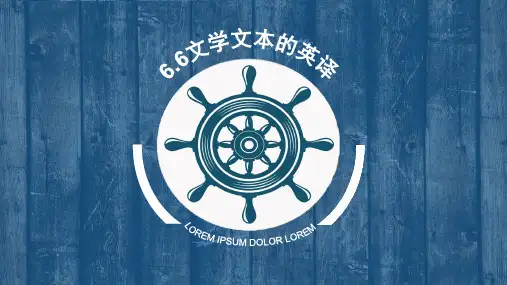
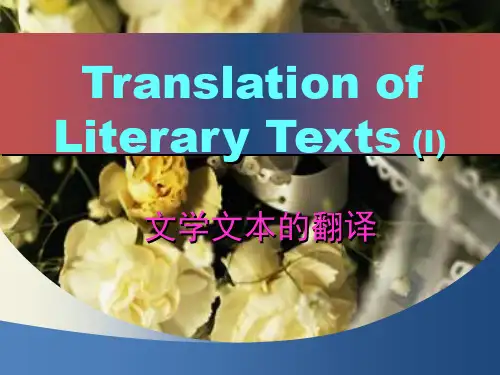
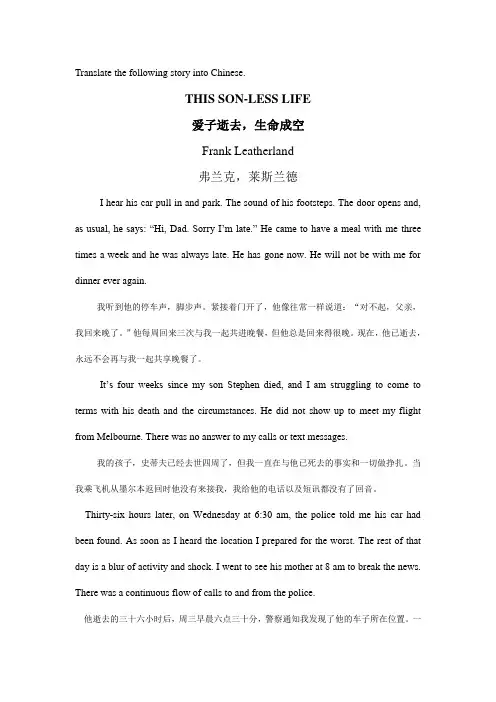
Translate the following story into Chinese.THIS SON-LESS LIFE爱子逝去,生命成空Frank Leatherland弗兰克,莱斯兰德I hear his car pull in and park. The sound of his footsteps. The door opens and, as usual, he says: “Hi, Dad. Sorry I’m late.” He came to have a meal with me three times a week and he was always late. He has gone now. He will not be with me for dinner ever again.我听到他的停车声,脚步声。
紧接着门开了,他像往常一样说道:“对不起,父亲,我回来晚了。
”他每周回来三次与我一起共进晚餐,但他总是回来得很晚。
现在,他已逝去,永远不会再与我一起共享晚餐了。
It’s four weeks since my son Stephen died, and I am s truggling to come to terms with his death and the circumstances. He did not show up to meet my flight from Melbourne. There was no answer to my calls or text messages.我的孩子,史蒂夫已经去世四周了,但我一直在与他已死去的事实和一切做挣扎。
当我乘飞机从墨尔本返回时他没有来接我,我给他的电话以及短讯都没有了回音。
Thirty-six hours later, on Wednesday at 6:30 am, the police told me his car had been found. As soon as I heard the location I prepared for the worst. The rest of that day is a blur of activity and shock. I went to see his mother at 8 am to break the news. There was a continuous flow of calls to and from the police.他逝去的三十六小时后,周三早晨六点三十分,警察通知我发现了他的车子所在位置。
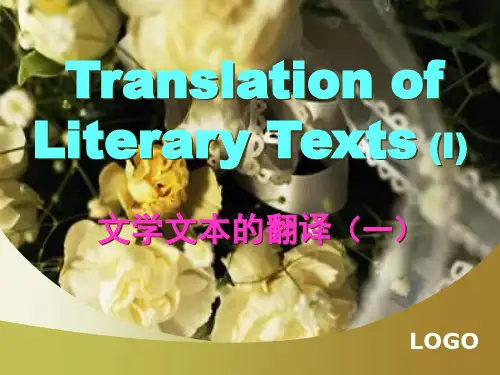

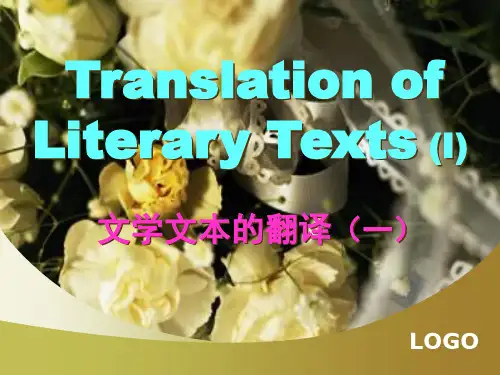
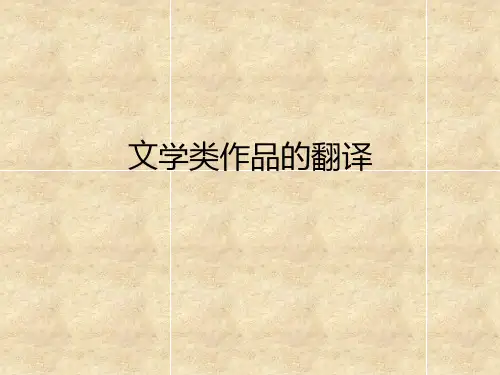

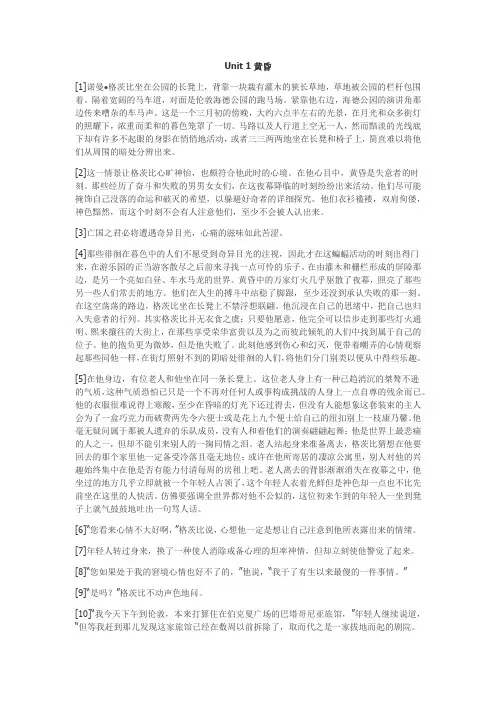
Unit 1 黄昏[1]诺曼•格茨比坐在公园的长凳上,背靠一块栽有灌木的狭长草地,草地被公园的栏杆包围着。
隔着宽阔的马车道,对面是伦敦海德公园的跑马场。
紧靠他右边,海德公园的演讲角那边传来嘈杂的车马声。
这是一个三月初的傍晚,大约六点半左右的光景,在月光和众多街灯的照耀下,浓重而柔和的暮色笼罩了一切。
马路以及人行道上空无一人,然而黯淡的光线底下却有许多不起眼的身影在悄悄地活动,或者三三两两地坐在长凳和椅子上,简直难以将他们从周围的暗处分辨出来。
[2]这一情景让格茨比心旷神怡,也颇符合他此时的心境。
在他心目中,黄昏是失意者的时刻。
那些经历了奋斗和失败的男男女女们,在这夜幕降临的时刻纷纷出来活动。
他们尽可能掩饰自己没落的命运和破灭的希望,以躲避好奇者的详细探究。
他们衣衫褴褛,双肩佝偻,神色黯然,而这个时刻不会有人注意他们,至少不会被人认出来。
[3]亡国之君必将遭遇奇异目光,心痛的滋味如此苦涩。
[4]那些徘徊在暮色中的人们不愿受到奇异目光的注视,因此才在这蝙蝠活动的时刻出得门来,在游乐园的正当游客散尽之后前来寻找一点可怜的乐子。
在由灌木和栅栏形成的屏障那边,是另一个亮如白昼、车水马龙的世界。
黄昏中的万家灯火几乎驱散了夜幕,照亮了那些另一些人们常去的地方。
他们在人生的搏斗中站稳了脚跟,至少还没到承认失败的那一刻。
在这空荡荡的路边,格茨比坐在长凳上不禁浮想联翩。
他沉浸在自己的思绪中,把自己也归入失意者的行列。
其实格茨比并无衣食之虞;只要他愿意,他完全可以信步走到那些灯火通明、熙来攘往的大街上,在那些享受荣华富贵以及为之而彼此倾轧的人们中找到属于自己的位子。
他的抱负更为微妙,但是他失败了。
此刻他感到伤心和幻灭,便带着嘲弄的心情观察起那些同他一样,在街灯照射不到的阴暗处徘徊的人们,将他们分门别类以便从中得些乐趣。
[5]在他身边,有位老人和他坐在同一条长凳上。
这位老人身上有一种已趋消沉的桀骜不逊的气质,这种气质恐怕已只是一个不再对任何人或事构成挑战的人身上一点自尊的残余而已。
品味散文My Bookby George Robert Gissing (1857—1903)Dozens of my books were purchased with money which ought to have been spent upon what are called necessities of life. Many a time I have stood before a stall, or a bookseller's window, torn by conflict of intellectual desire and bodily need。
At the very hour of dinner, when my stomach clamored or food, I have been stopped by sight of a volume so long coveted, and marked at so advantageous a price, that I could not let it go: yet to buy it meant pangs of famine。
My Heyne’s Tibullus was grasped at such a moment. It lay on the stall of the old book —shop in Goodge Street —— a stall where now and then one found an excellent thing among quantities of rubbish.Sixpence was the price —— sixpence! At that time I used to eat my midday meal (of course, my dinner) at a coffee-shop, such as now, I suppose, can hardly be found。
文学翻译:1.《柳家大院》(节选)原文作者:老舍这两天我们大院里又透着热闹,出了人命。
事情可不能由这儿说起,得打头来。
先交代我自己吧。
我是个算命的先生,我也卖过酸枣、落花生什么的。
那可是先前的事了。
现在我在街上摆卦摊儿;好了呢,一天也抓弄三毛五毛的。
老伴儿早死啦,儿子拉洋车。
我们爷儿俩住着柳家大院的一间北房。
除了我这间北房,大院里还有二十多间房呢。
一共住着多少家子,谁说得清?住两间房的就不多,又搭上今儿个搬来,明儿个又搬来,我没那么好的记性。
大家见面,招呼声“吃了吗?”透着和气,不说呢,也没什么。
大家一天到晚为嘴奔命,没有工夫扯闲盘儿。
爱说话的自然也有。
可得先吃饱啦。
王家住两间房。
老王和我算是柳家大院最“文明”的人了。
“文明”是三孙子。
2.《柳家大院》(节选)译文A prettykick-up has been the order of the day again in our compoun d lately, for a life has been lost.Butthisisn’tthewaytoopentheball. We shouldgo the whole animal.First , a few words about myself.I’mafortune-teller. Once I was a venderof sour dates , ground-nuts and what not. But that was ages ago. Now I keep a fortune-teller’sstallontheside-walk and can scrapeup three or five dimes a day at best. My old gal had long kickedup her heels. Myson’saricksha w-boy. That’swhathe’s. We two , fatherand son , hang our hats at a south-facingroom in the Liu’scompoun d.Besides the room we occupythere are twentymore rooms in the same compoun d. How many familie s live there , only God knows. Those who occupytwo rooms are quite few. Besides , they are alwaysonthego.Ihaven’tgotsuchagoodmemor yas to remembe r all that. When peoplemeet , theygreeteachotherwitha“Howdoyoudo?”, just to show their good neighbo urly feeling s. But if they shouldcut each other dead , nobodywould care. Whenone’sknocked about from pillarto post for his bread day in and day out , hewon’tfindgingerenoughfor gas and gaiters. Of course, there’sthosewhoarealljawlikeasheep’sheadamongus. But one can hardlybe in a mood for rag-chewingwhenone’sgutscrycupboar d .The Wang familyoccupie s two rooms. Old Wang and I are conside red the genteel fork in the compoun d. Gentili ty be hanged!注释:kick-up:有了问题,出了毛病open the ball:作为开头what not:诸如此类的东西old gal:(口)老伴kickedupone’sheels:(俚) 死ricksha w :人力车,黄包车hangone’shatson:指望,依靠on the go:(口)忙个不停cut sb. dead:不理睬某人knock about :(口)漂泊,游荡from pillarto post :四处奔走着,到处碰壁地,for his bread (俚) =for his moneyday in and day out :日复一日,每天不间断地ginger:(口)精力,活力,劲头gas :(俚)令人非常满意(或愉快的)的事(或人)bealljaw(likeasheep’shead):全是空话,废话连篇rag :(俚)姑娘,情人(指女性)guts:(用作单)贪食者be hanged:(用于诅咒语中)不得好死3.原文言语风格分析老舍先生是善于运用群众的言语大师。
英文文献全文翻译全文共四篇示例,供读者参考第一篇示例:English literature has a long and rich history, with countless works that have been translated into various languages around the world. From ancient epics like Beowulf and The Odyssey to modern classics like To Kill a Mockingbird and Harry Potter, English literature has captured the hearts and minds of readers for centuries.第二篇示例:The world of academic research is vast and ever-growing, with a wealth of knowledge and information being produced every day. One important aspect of this research is the publication of English-language academic articles. These articles cover a wide range of topics across various fields, from science and technology to social sciences and humanities.第三篇示例:English literature is a treasure trove of human culture and knowledge. The literary works of great writers from around theworld offer insights into the human experience, emotions, and imagination. Through the process of translation, these literary masterpieces are made accessible to a global audience, allowing people from different cultures and backgrounds to connect and appreciate the beauty of language and storytelling.第四篇示例:Abstract:Introduction:English literature holds a prominent position in the field of international academia, with a vast number of research articles, books, and journals being published in English. For researchers and scholars in non-English speaking countries, access to English literature is essential for staying up-to-date with the latest developments in their respective fields. However, understanding and interpreting English texts can present significant challenges due to linguistic, cultural, and contextual differences.Challenges in Translating English Literature:。
笔译的翻译Pen translation is a form of translation that refers to the process of translating written texts using a writing instrument, such as a pen. It is a traditional method of translation that has been practiced for centuries.Pen translation involves the translation of a source language text into a target language by hand, word by word, sentence by sentence. This method requires a deep knowledge of both the source and target languages and a great deal of concentration and attention to detail. The translator must carefully consider the meaning and context of the original text and accurately convey it in the target language.Pen translation requires a high level of language proficiency and writing skills. The translator must have a strong command of grammar, vocabulary, and syntax in both the source and target languages. They must also possess a thorough understanding of cultural nuances and context, as translation involves not only the literal meaning of words, but also the cultural subtleties and connotations associated with them.Pen translation can be a time-consuming process, as the translator must carefully write out each word and sentence in the target language, ensuring accuracy and clarity. It requires patience and precision, as any mistakes or inaccuracies can have a significant impact on the overall meaning and interpretation of the text. While pen translation is a traditional method, advancements in technology have significantly impacted the field of translation.Computer-assisted translation tools, such as translation memory and machine translation, have made the process faster and more efficient. These tools can help translators by suggesting translations or providing reference materials, saving time and effort.However, even with the advent of technology, pen translation still plays a significant role in certain situations. It is often used for the translation of handwritten documents, such as personal letters, historical manuscripts, or legal documents, where precision and accuracy are crucial. Pen translation is also valuable in situations where a translator may not have access to or prefer not to rely on technology, such as in remote or offline environments.In conclusion, pen translation is a traditional method of translating written texts that requires in-depth language proficiency, writing skills, and attention to detail. While advancements in technology have revolutionized the field of translation, pen translation still holds value in certain situations where accuracy and precision are paramount.。
Literary Translation1.Definition of Style.a.the revised Edition of A Dictionary of Literary Terms (J.A. Cuddon, 1979): Style is “thecharacteristic manner of expression in prose or verse; how a particular writer says things.The analysis and assessment of style involves examination of a writer’s choice of words, his figures of speech, the devices (rhetorical and otherwise), the shape of his sentences (whether they be loose or periodic), the shape of paragraphs --- indeed, of every conceivable aspect of his language and the way in which he uses it.”b.Theodore Savory: Style is the essential characteristics of every piece of writing, the outcomeof the writer’s personality and his emotions at the moment, and no single paragrraph can be put together withour revealing in some degree the nature of its author.c.de Buffon: style is the man2.Translatability of styleTheodore Savory: some people say “A translationshould reflect the style of the original”and others say “a tranlation should possess the style of the translator.”Alexander F. TytlerNidaMao Dun: the original literary style is translatable.“Literary translation is to reproduce the oriiginal artistic images in another language so that the reader of the translation may be inspired, moved and aesthetically entertained in the same way as one reads the original”.The arguments for the opinion that the style of the original work is untranslatable:Different language can’t express the same style.Puns, poem and other things are difficult to translate.(but a qualified translator is usually possessed of some appropriate ways of cracking his hard nuts in translation once he is determined to translate a work. E.g.This paper is our passport to the gallows. But there‟s no backing out now. If we don‟t hang together, we shall most assuredly hang seperately. 这张纸片儿就是咱们上绞架的通行证。